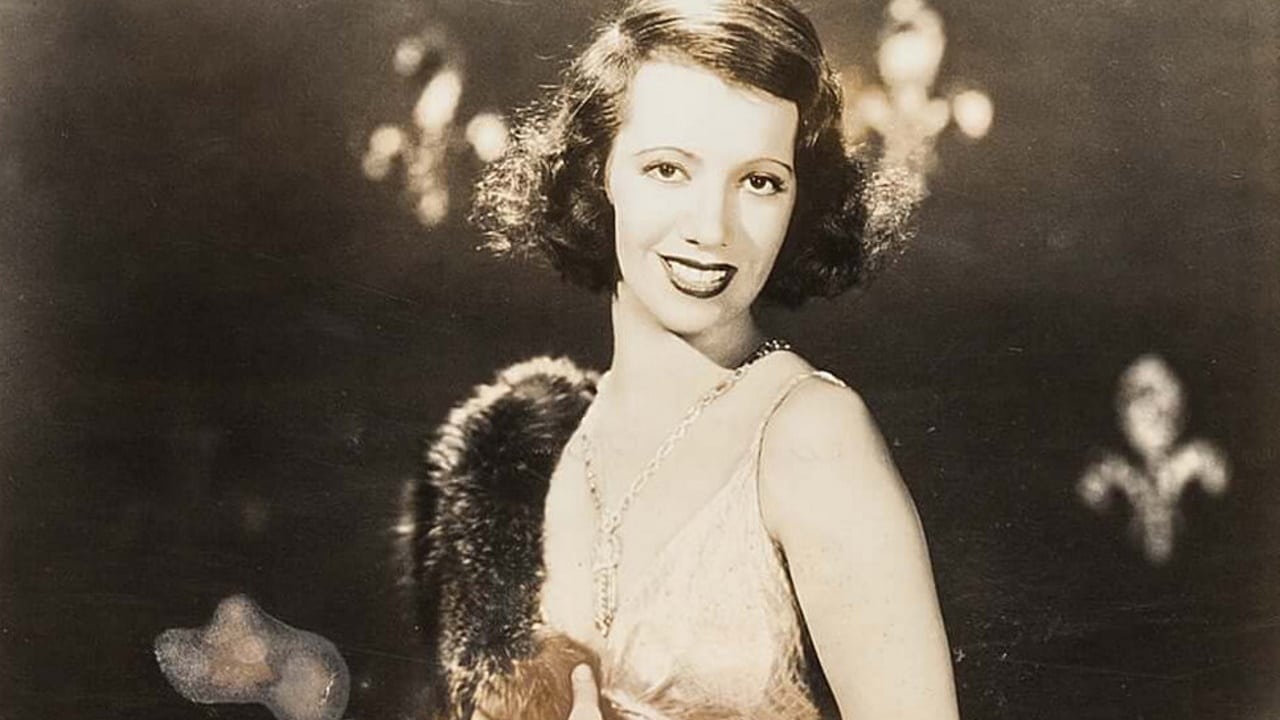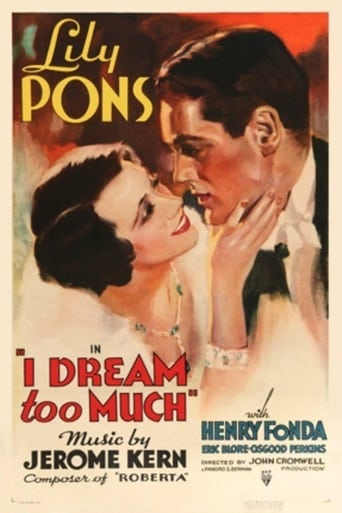



Too much of everything
not horrible nor great
A Brilliant Conflict
In truth, there is barely enough story here to make a film.
View MoreThis is the type of film that might have appealed to audiences in 1935, but today, you have to watch almost in secret because it could drive your neighbors to call the police on you for Lily Pon's voice disturbing the peace. It's loud and shrill, certainly like no voice you'd hear on what remains of the radio. She's a runaway Parisian girl who meets American songwriter Henry Fonda, wakes up married to him and accidentally becomes a successful opera star (with a score that Fonda wrote but didn't get credit for) while he stews over masculine pride. Fonda, in his first year in films, shows a potential for comedic timing, and Pons is humorous in small doses. That voice, though, might get dogs yowling because that voice doesn't exist anymore outside indoor opera companies, particularly European ones. One song, about a jockey on a carousel, expresses my sentiment about classic style music mixed with popular music; it doesn't always work. Pons starts singing the song to a fidgety kid who is whaling yet immediately stops and looks up at her with a Cheshire cat grin as she starts her own yowling. Pretty soon, everybody in this busy Paris district is joining in, some for individual choruses, and I cringed, both in annoyance and amusement. When she tries to sing a bluesy number in a cafe, it's totally out of place. Voices like hers are not made for musical comedy, and even in the choral numbers, it's far more high brow than operetta. The finale includes a fashion show that is camp now, even if female audiences went gaga over it in 1935. Today, it's a visual delight for drag queens who couldn't find what they were looking for in the color fashion show in "The Women". Eric Blore and his barking seal, Duchess, get a few laughs, but a scene revealing that Duchess has "passed on" dampens the light atmosphere. Lucille Ball, unrecognizable pretty much as a platinum line, gets prominent billing in the credits (probably a re-release after she was leading lady in B films), but really has only one line. I keep forgetting about her and Fonda in this, reunited 7 years later for "The Big Street" and 33 years later in "Yours, Mine and Ours". Pons tried to break into Jeanette MacDonald and Grace Moore territory in film, but only made a small handful before returning to live performance. As for Fonda, it would take a little time, but a few years down the road, he was the one writing his own ticket. This film has him way up, sadly, in the rear mezzanine.
View MoreThe very concept of HENRY FONDA (the "aw shucks" guy from the sticks) as the husband of an opera singer (LILY PONS) is a weak idea that must have posed quite a problem for the scriptwriters. You have to wonder how audiences accepted this idea way back then because Fonda's youthful image was strictly the unsophisticated farm boy type.But that's not the only improbable thing about I DREAM TOO MUCH. The slight story is silly (as most musicals of the '30s were), and enjoyment of the film will depend entirely on whether or not you like to hear Miss Pons give out with her flute-like operatic voice on several well chosen arias. She certainly had an amazing vocal range and her rendition of "The Bell Song" from L'Akme is a highlight of this otherwise rather ordinary film.ERIC BLORE is there for a few standard comic routines and you can even catch a glimpse of LUCILLE BALL as a tourist in one of her early roles at RKO. But there's nothing much one can say about the film itself except that it gave audiences a chance to hear why Pons was such a favorite at the Met for a period amounting to something like thirty years. Otherwise, it's strictly routine stuff as romantic comedy, coming to life only when Pons sings.
View MoreOh goody - Yet another movie wherein the husband feels threatened by his wife's talent, and can't deal with the blow to his ego when her career is more successful and she makes more money than he does. I really don't enjoy these kinds of stories. Inevitably the wife gives up her career to have babies and support her hubby's dreams.What I don't understand is, why can't Fonda and Pons' characters work TOGETHER and live as equals, each contributing to their income? After all, their skills complement each other, he being a composer, and she a singer. But no, after helping to make his show a hit, the little woman must retire and sing nothing but lullabies for their kids. Guess his fragile little ego can't stand to share the spotlight. Sigh.If you can stand the sexism, this film has some pleasant songs and fairly humorous moments - Fonda's drunk scenes, for instance. And I just love the part where he regrets marrying Pons the morning after, tells her that she's too skinny and he'll probably beat her, but relents when he discovers what a good cook she is. Haw! Now *that's* comedy! Um, yeah. There's just no escaping the sexism, is there?There's really not much to recommend about this film except the always amusing Eric Blore, delightful in his too-few scenes. He talks to a seal, he talks about a seal, he refuses to serve drinks as a waiter - it's all good. Lily Pons isn't the best actress - very limited range of facial expressions. But her vocal range was anything but limited ...apparently she could reach high *F*. Yowza. Coincidentally, that's just about the grade I'd give this movie. Nah, I'd give it a high C.
View MoreBecause of Lily Pons' high soprano, this film was rudely nicknamed "I Scream Too Much." Actually, Pons had a lovely light voice with a girlish sound; her singing didn't sound like screaming. In spite of my love of serious music, I have to laugh at the nickname.Henry Fonda and Lily Pons? OK. Today, combining a young male romantic lead with an opera singer seems strange. In the mid 20th Century, classical music wasn't viewed suspiciously by most people, as it is now. No rock, rap, or hip hop yet (now THAT's what I call screaming).I hope this film will become available on DVD or tape - it's been years since I've seen it.
View More